
The South African Republic, also known as the Transvaal Republic, was an independent Boer republic in Southern Africa which existed from 1852 to 1902, when it was annexed into the British Empire as a result of the Second Boer War.
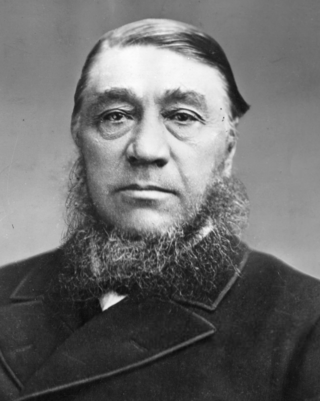
Stephanus Johannes Paulus Kruger, better known as Paul Kruger, was a South African politician. He was one of the dominant political and military figures in 19th-century South Africa, and State President of the South African Republic from 1883 to 1900. Nicknamed Oom Paul, he came to international prominence as the face of the Boer cause—that of the Transvaal and its neighbour the Orange Free State—against Britain during the Second Boer War of 1899–1902. He has been called a personification of Afrikanerdom, and remains a controversial figure; admirers venerate him as a tragic folk hero.

The Orange Free State was an independent Boer sovereign republic under British suzerainty in Southern Africa during the second half of the 19th century, which ceased to exist after it was defeated and surrendered to the British Empire at the end of the Second Boer War in 1902. It is one of the three historical precursors to the present-day Free State province.

The Boer republics were independent, self-governing republics formed by Dutch-speaking inhabitants of the Cape Colony and their descendants. The founders – variously named Trekboers, Boers, and Voortrekkers – settled mainly in the middle, northern, north-eastern and eastern parts of present-day South Africa. Two of the Boer republics achieved international recognition and complete independence: the South African Republic and the Orange Free State. The republics did not provide for the separation of church and state, initially allowing only the Dutch Reformed Church, and later also other Protestant churches in the Calvinist tradition. The republics came to an end after the Second Boer War of 1899–1902, which resulted in British annexation and later incorporation of their lands into the Union of South Africa.
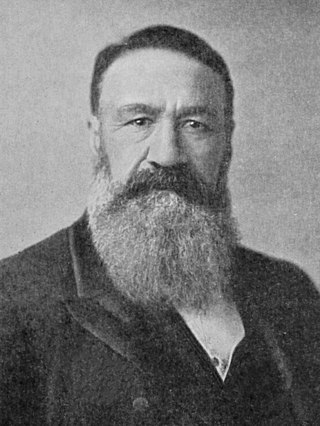
Petrus Jacobus Joubert, better known as Piet Joubert, was Commandant-General of the South African Republic from 1880 to 1900. He also served as Vice-President to Paul Kruger from May 1883 to October 1884 and from May 1896 until his death. He served in First Boer War, Second Boer War, and the Malaboch War.

The Volksraad of the South African Republic was the parliament of the former South African Republic (ZAR), it existed from 1840 to 1877, and from 1881 to 1902 in part of what is now South Africa. The body ceased to exist after the British Empire's victory in the Second Anglo-Boer War. The Volksraad sat in session in Ou Raadsaal in Church Square, Pretoria.
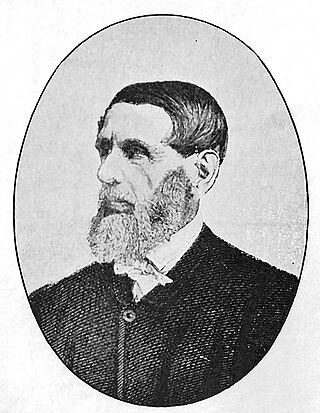
Jacobus Nicolaas Boshof was a South African (Boer) statesman, a late-arriving member of the Voortrekker movement, and the second state president of the Orange Free State, in office from 1855 to 1859.
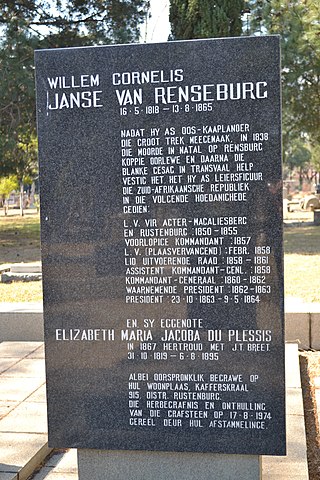
Willem Cornelis Janse van Rensburg was the second President of the Executive Council of the South African Republic, from 18 April 1862 until 10 May 1864.

Stephanus Schoeman was President of the South African Republic from 6 December 1860 until 17 April 1862. His red hair, fiery temperament and vehement disputes with other Boer leaders earned him the moniker "Stormvogel den Noorden," "Storm bird of the North."

Schalk Willem Burger was a South African military leader, lawyer, politician, and statesman who was acting president of the South African Republic from 1900 to 1902, whilst Paul Kruger was in exile. At the age of 21, Burger worked as a clerk in the office of the field coronet. He married his wife, Alida Claudina de Villiers, during this time.

The Transvaal Civil War was a series of skirmishes during the early 1860s in the South African Republic, or Transvaal, in the area now comprising the Gauteng, Limpopo, Mpumalanga, and North West provinces of South Africa. It began after the British government had recognised trekkers living in the Transvaal as independent in 1854. The Boers divided into numerous political factions. The war ended in 1864, when an armistice treaty was signed under a karee tree south of the site of the later town of Brits.

Jan Christoffel Greyling Kemp was a South African Boer officer, rebel general, and politician.

Johannes Hermanus Michiel 'Jan' Kock was a Boer general and politician.

Harry Struben born Hendrik Wilhelm Struben aka Henry William Struben was the brother of Frederick Struben, who together managed the first gold-mining operation on the Reef. They were the sons of Johan Marinus Struben, a South African Republic official, and his wife Frances Sarah Beattie of Scottish origin. Harry was born during a yacht trip along the Lower Rhine. His family emigrated to Pietermaritzburg in Natal in 1850, and moved to Pretoria five years after.

The Vice State President of the South African Republic was the second highest political position in the South African Republic.

Ewald Auguste Esselen was a South African barrister who served as State Attorney of the South African Republic from 1894 to 1895.
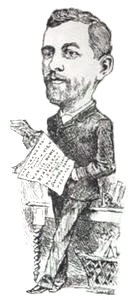
Edmund Francis Bourke was an Irish-South African politician and businessman who served as a member of the Transvaal Legislative Council and the first mayor of Pretoria.
Johannes Petrus Meyer was a politician, member of the Volksraad of the South African Republic, mining entrepreneur, and farmer; he is the man for whom Meyerton and Meyersdal are named.

Lucas Johannes Meyer, was a Boer general, member of the Transvaal government and president of the Nieuwe Republiek.
Christiaan Johannes Joubert (1834-1911) was a former member of the executive council and Vice State President of the South African Republic.















